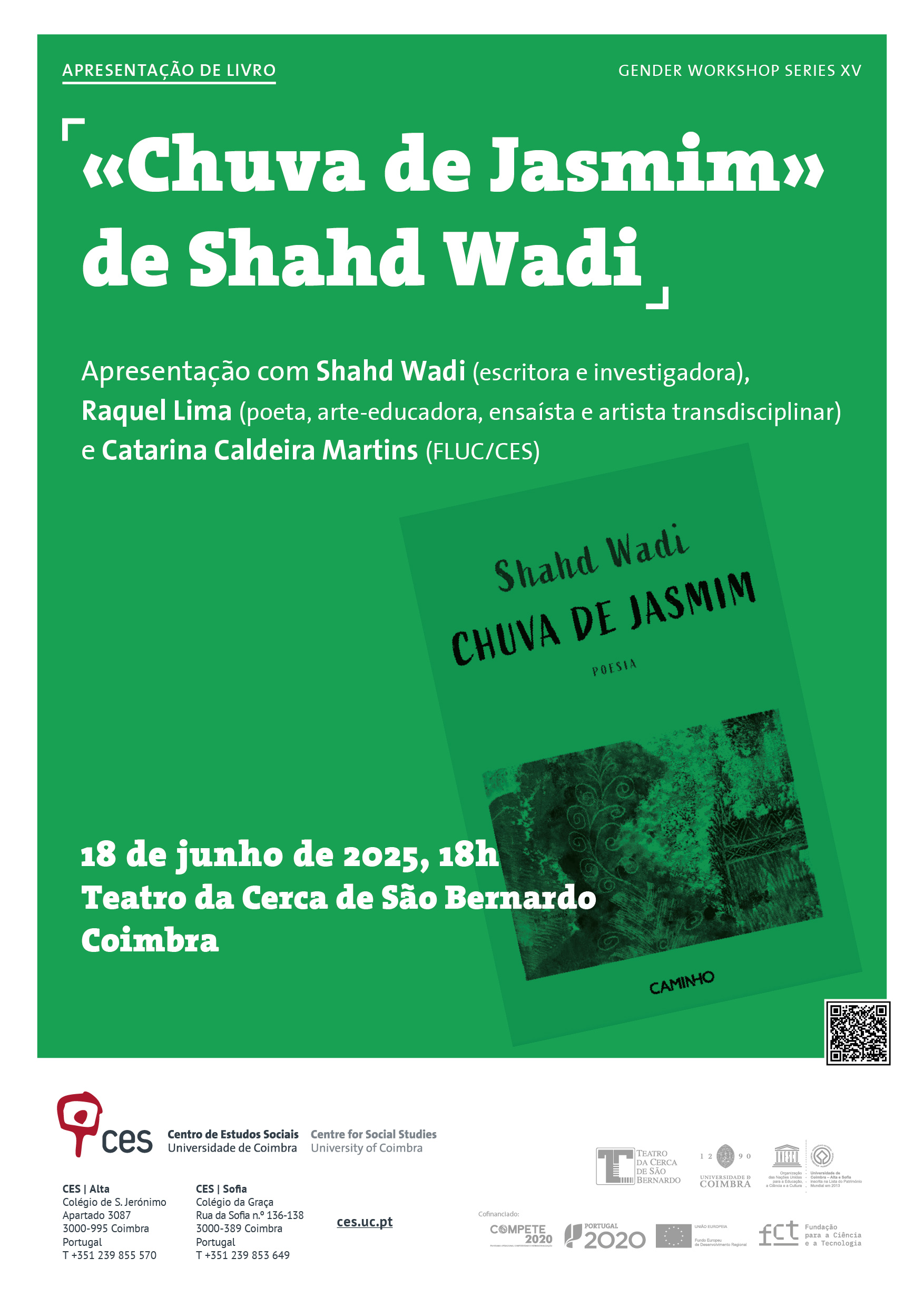Book Presentation | Gender Workshop Series
«Chuva de Jasmim» by Shahd Wadi
June 18, 2025, 18h00
Teatro da Cerca de São Bernardo (Coimbra)
With Shahd Wadi, Raquel Lima and Catarina Caldeira Martins
About the book
“Phrases and words in Portuguese, a language I'm still learning, tear at the insides of my Palestinian body. I resist with all my might, only a few manage to escape. My lips tighten at the impossibility of speaking of my body that is not, of its place that is never. I won't tell a soul that I can't distinguish «here» from «there». Nor that languages and desires happen in me simultaneously.
I cannot, I cannot, I cannot spell the Arabic name of the person who died yesterday in Gaza, or the day after. I shut my mouth before the story of my family, expelled from their land after the Palestinian Nakba catastrophe in 1948. I hold my hand in front of my voice to avoid a mistake in Portuguese, while I tell a joke or even a dream of freedom, even if it's all freedom. I recite nothing. I endure one blow after another from a verse that wished to abandon me. I remain silent.
Today I carry this book with me for my body gives up and is finally a poem.
Flag, dance, bougainvillea and angel come together to unblock the pen from all my failed, obscene and beautiful languages. Without consent, my fire and my poppies come loose and I release my scribbles so that the «mistake» becomes a verse, the people a bird, the exile a return and I a border. I write a poem, a book of poems, so that there will be Jasmine Rain.» Shahd Wadi
Bio notes
Shahd Wadi is Palestinian, among other possibilities, but freedom is above all Palestinian. She searched for her resistances when she wrote the country's first doctoral dissertation in Feminist Studies at the University of Coimbra, which served as the basis for the book Corpos na Trouxa: histórias-artísticas-de-vida de mulheres palestinianas no exílio (Almedina, 2017). Among her most recent publications, she co-authored the anthologies Volta Para Tua Terra: Não Há Abril Sem Imigrantes (Urutau, 2024) and Ask the Night for a Dream: Palestinian Writing from the Diaspora (Palestine Writes, 2024). She exercises her freedom in what she does, travelling between writing, curating, research, translation, performance and artistic consultancy. She was recently named Galician Universal Writer of 2025. Her writing and research deals with the Israeli occupation of Palestine and she considers the arts to be a testimony to lives. Also of her own.
Raquel Lima is a poet, art educator, essayist and transdisciplinary artist. She has a degree in Artistic Studies - Performing Arts and is a PhD researcher in Post-Colonial Studies, with a particular interest in orature, intergenerational memory, Afro-diasporic movements and contemporary practises of escapism, abstraction and healing. She has presented her academic and artistic work in several countries, notably at the Venice Biennale and the São Paulo Biennale. She was voted one of the 100 most influential black personalities in Portuguese-speaking countries by Bantumen magazine. She published the book Ingenuidade Inocência Ignorância and co-founded the União Negra das Artes in Portugal.
Catarina Caldeira Martins is an Associate Professor in the Department of Languages, Literatures and Cultures at the Faculty of Arts and Humanities of the University of Coimbra and a Researcher at the Centre for Social Studies. She was a reader for several years at the Cheikh Anta Diop University in Dakar. She holds a PhD in German Literature from the University of Coimbra (2008) and an Aggregate Degree in Cultural and Literary Studies, with a focus on feminist and decolonial studies. She has published on feminist and postcolonial studies, comparative literature, German-language literature and African literatures, particularly those of women. Her current areas of research include decolonial studies and feminist studies, associated with themes and issues in literatures and cultures. She teaches on the PhD programmes in Feminist Studies, Discourses: History, Culture and Society, and Literature and Culture Studies. She is Director of the CES Collection.


